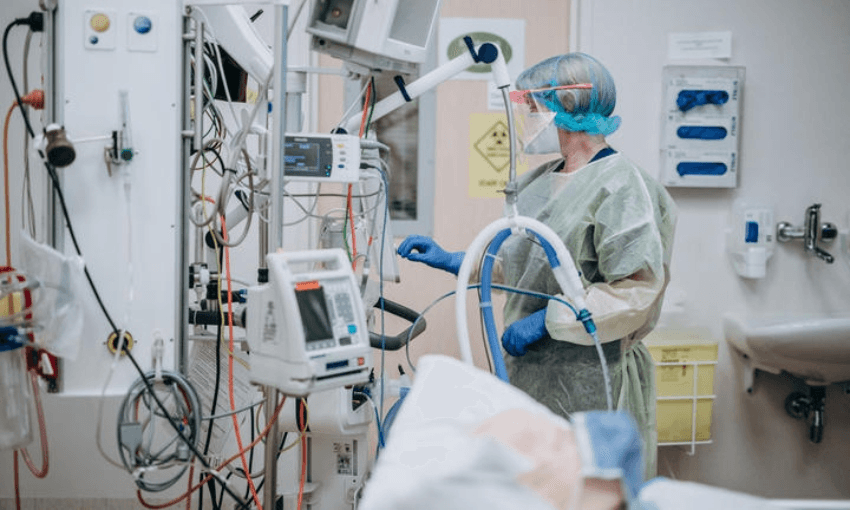Like other viruses, Covid-19 could have health impacts long after a case is declared “recovered”. What those impacts are is only now coming to light.
Cases of Covid-19 in New Zealand have mostly been mild. A cough, some aches, a sore throat; symptoms that cleared up within two weeks, enough for many of our 1,154 confirmed cases to be classified “recovered” less than a month after they were diagnosed.
In late May, a patient entered hospital with severe respiratory symptoms and tested positive for Covid-19 – again. He’d first been diagnosed in March. The Spinoff was contacted by a concerned friend, who gave us details of the experience: he was diagnosed, quarantined, declared “recovered” and returned home to his family in mid-April.
Just over a month later, his respiratory health had declined and he was experiencing blood clotting problems bad enough to prompt a visit to an emergency department. He was retested for Covid-19 and it came back positive.
To be declared recovered, at least 10 days must have passed since onset of the virus, plus 48 hours symptom free. However, it’s becoming clear that – like the SARS coronavirus before it – Covid-19 can have longer term effects.
After the 2003 SARS epidemic, post-viral effects included chronic fatigue (ME) symptoms up to three years after the virus had passed. Some researchers expect similar concerns lie in wait for recovered Covid-19 cases.
In New Zealand, our low number of cases and quick response means we don’t currently have the numbers to see a pattern of post-viral effects. Overseas, however, it’s becoming clear that Covid-19’s effects linger after the virus is rendered inactive.
A number of originally mild cases in the US have, two months down the line, reported more severe respiratory symptoms alongside more frightening developments: memory loss, delirium, and loss of taste and smell. These people are being called “long haulers”.
Director general of health Dr Ashley Bloomfield told media on June 3 that doctors would be looking out for post-viral effects. “I know our GPs here will be very alert to looking for any symptoms, particularly respiratory or haematological (blood-related) ones, or cardiac ones,” he said.
However, he hadn’t heard any reports on ongoing symptoms.
On June 4 he acknowledged case reports that documented post-viral symptoms including residual loss of smell and taste. “It seems that, probably, the virus is doing some damage to the nerve that creates a sense of smell, and nerves can take some months to recover,” he said.
The case The Spinoff is aware of would be reaching the three-month mark, making him a long hauler, but it’s believed his positive test is a result of virus cells that are inactive.
The current Ministry of Health case definitions state there is “little value in retesting for Covid-19 as a positive PCR does not mean they are infectious”. The guidelines recommend retesting only if the person’s condition deteriorates and they are hospitalised, and this retesting is done to check for other conditions, such as bacterial pneumonia.
The guidelines state that retesting positive for Covid-19 does not mean the case needs to be isolated.
Prof Mark Thomas of the University of Auckland said it was very unlikely a long hauler would still be infectious. While a swab might show virus cells are present in the body, Thomas believes it’s likely those cells are inactive. “Antibodies will have coated the virus,” he explained. But could the virus could come back from being slathered into inactivity with antibodies? Thomas thinks not, at least as far as he currently knows.
Dr Caroline McElnay, director of public health, said researchers were proposing follow-up studies on those who’d recovered from Covid-19, but that to her knowledge none had commenced.
“This type of case is starting to be well described overseas, where there have been reports of many long-term health problems including problems with the lungs, kidneys, cognition and mental health,” she said. “We have very little experience of managing such cases in New Zealand.
“We would expect the GP to refer to an appropriate specialist for a review depending on the situation,” she said.
Yesterday, New Zealand’s one active case of Covid-19 cleared up. While that’s cause for celebration, Dr Amanda Kvalsvig of the University of Otago told the Science Media Centre that the official definition of recovery and the reality of recovery can be two different things.
“People recovering from Covid-19 infection are reporting a variety of concerns ranging from feeling unusually tired to more serious post-viral complications,” she said. “True recovery in the sense of feeling completely back to normal may take much longer than expected and this issue will need attention in the weeks and months to come.”

